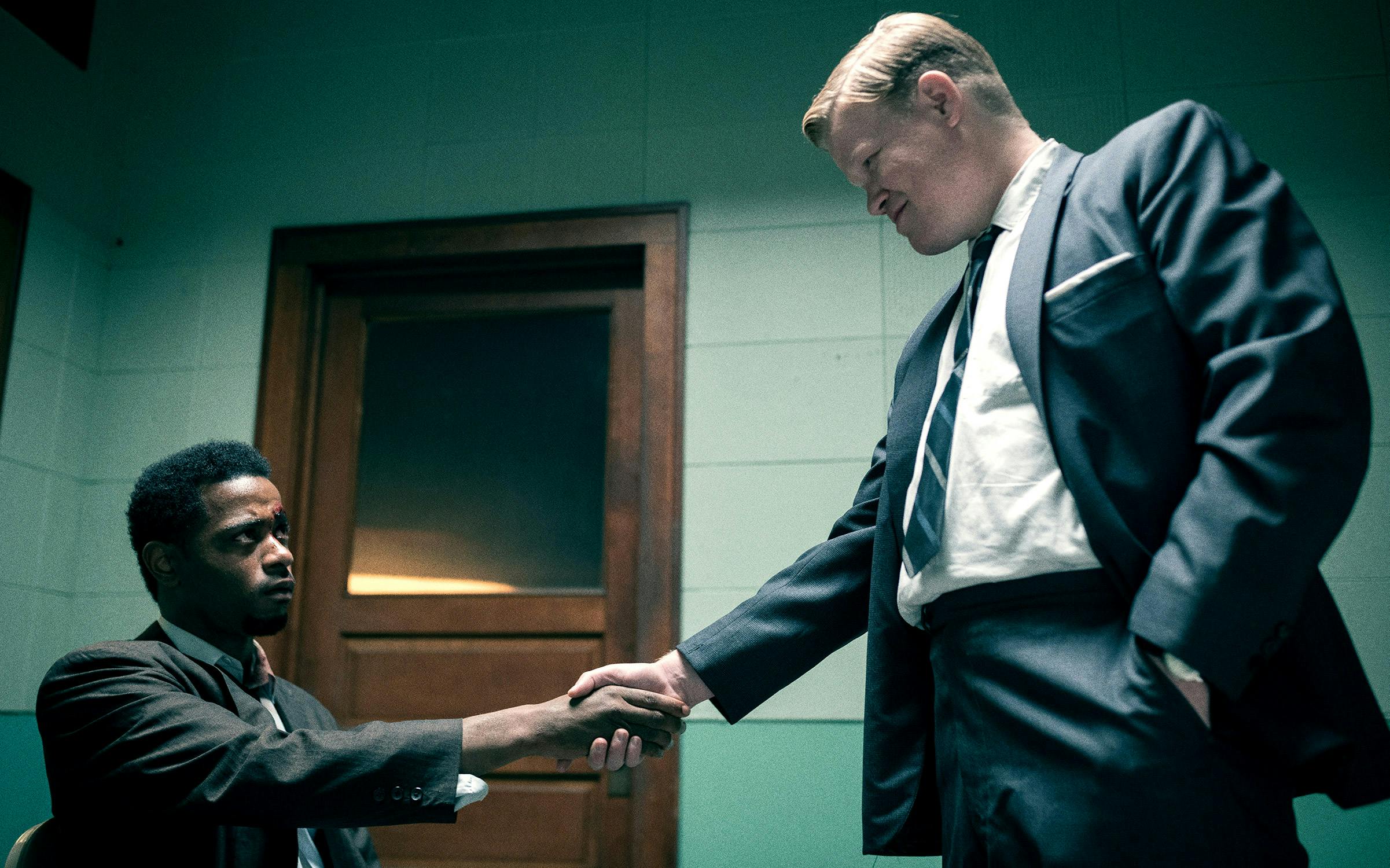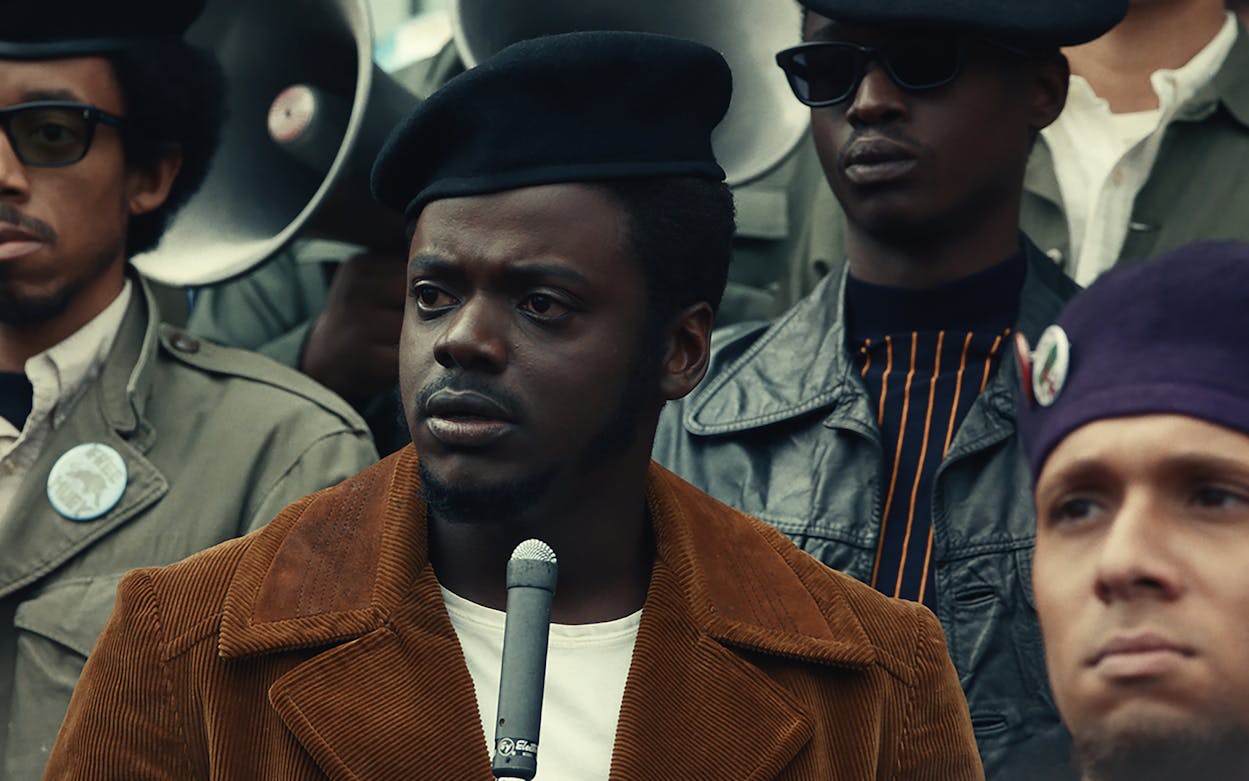Shaka King’s Judas and the Black Messiah is a magnetic, pulsating thriller, filled to the brim with stellar performances from its leads, Daniel Kaluuya and LaKeith Stanfield, and supporting actors—Dominique Fishback in particular. The film (now streaming on HBO Max) is effortlessly cool, with a wardrobe that belongs in full spreads in GQ, because, well, costume designer Charlese Antoinette Jones was actually inspired by vintage issues of GQ. It doesn’t get much hipper than the military green jackets, black berets, or Stanfield cruising down a Chicago street in a new Buick while “Deep Gully” by Outlaw Blues Band booms through your speakers. With each flash of style, the film punches back with some substance. Very few moments in its two-hour runtime feel superfluous, but you can distill Judas and the Black Messiah’s thesis into three key scenes.
The first sees Fred Hampton (Kaluuya), the Illinois chairman of the Black Panther Party, walk into a Young Patriots Organization meeting in Uptown Chicago with a select group of fellow Black Panthers in tow. The room is full of white, working-class, left-wing activists from Appalachia and the South. One wall is adorned with a Confederate flag—a recruitment tool aimed at impoverished white people who’ve immigrated from the South, but a symbol of hatred to the Panthers. After some crosstalk and arguing, Hampton acknowledges the common ground in their struggles against poverty and oppression and poses a question for the room: “What if the overseer banded with the slave and cut the master’s throat?” He then gives a rousing speech, and the first Rainbow Coalition—a multicultural organizing movement—is born. We see Hampton’s hypnotic ability to galvanize a crowd and the extent to which he’s willing to go to build solidarity with oppressed people.
The second pivotal scene is a relatively short one. FBI director J. Edgar Hoover (Martin Sheen), sits in his office, making small talk with one of his subordinates, special agent Roy Mitchell (played by Dallas-born Jesse Plemons, of Friday Night Lights and Breaking Bad). They talk about their children, and Hoover ominously switches gears. In an effort to motivate Mitchell in the agency’s fight against the Black Panther Party, Hoover asks a disturbing question: “Your daughter, Samantha, what will you do the day she brings home a young Negro male?” Mitchell’s daughter is just eighteen months old. Mitchell is shocked, not so much by the racism, but because Hoover is so crass. With calm and patience, Mitchell replies, “She won’t, sir.” He understands he’s at war for the soul of his country and what he considers the degradation of his culture, but he wishes his boss could have been more polite about it.

The final key scene finds special agent Mitchell sitting across from the informant he’s strong-armed into infiltrating the Black Panther Party, William O’Neal (Stanfield). Over dinner at a fancy restaurant, Mitchell gives O’Neal an ultimatum. He must draw the blueprint for Hampton’s apartment, or the FBI will reveal he’s a rat, which could likely end in his torture or death at the hands of the comrades he betrayed. A visibly upset O’Neal complies, even though he knows the FBI plans to kill Hampton—then deputy chairman of the Black Panthers—as he sleeps next to his nine-months-pregnant fiancée, Deborah Johnson (Fishback). O’Neal chooses his own survival, but it’s clear he will never get over the guilt.
Judas and the Black Messiah isn’t a Fred Hampton biopic. Not specifically. The thriller explores the legendary Black Panther leader’s radical politics, charismatic persona, and significant organizing achievements—for example, he led a free lunch program that fed thousands of kids and served as a national model. But the movie’s focal point is the story of how William O’Neal betrayed him. The first thing we see after the production companies’ logos crawl across the screen is the pain written on LaKeith Stanfield’s face as he plays a middle-aged O’Neal who is asked about his time in the Black Panthers. The last thing we see before the credits roll is the remorse and terror in his eyes.
O’Neal had many reasons to do what he did. His Faustian bargain kept him alive and out of jail, and he earned a sizable paycheck—the FBI paid him more than $200,000 in today’s dollars. He did what he felt he had to do to survive, and survival by any means necessary is what propels all of the principal characters in Messiah, whether the means are justified or not.
The choice to humanize O’Neal and make him something more than a deceptive weasel (and he’s undoubtedly weaselly and incredibly deceptive) is a smart one from director King, his co-screenwriter Will Berson, and Stanfield. The deft touches of hubris and neurosis Stanfield brings into “Wild” Bill O’Neal only build the story’s tension. O’Neal rips pages from Ayn Rand’s book of philosophy, seeing himself as a heroic being, with his own happiness as his life’s moral purpose. Hampton is portrayed as an altruistic man of the people, which only emphasizes the differences between the two young men. And they were really young. Hampton was only 21 when he was killed while he slept as the result of a no-knock raid. O’Neal was only 17 when he became entangled with the FBI. The fact that Kaluuya (31) and Stanfield (29) do not capture the youth of the men they’re playing is one of the few ways the film falls short. Messiah would have been much more forceful if our leads were, say, a Moonlight reunion with Ashton Sanders and Jharrel Jerome (Sanders does have a supporting role) instead of the Get Out reunion we’re given. This is a minor quibble, though, because Kaluuya and Stanfield are both phenomenal.
Kaluuya’s portrayal of Hampton is somewhat of a departure from his previous work. In films like Get Out and Widows, his best moments are pervaded by silence; he lets his eyes do all of the work. While Kaluuya does deploy his steely glare and signature head tilt to great effect in Messiah, what stands out in this film are his monologues. Hampton was a powerful orator whose speeches rallied thousands to join the Black Panthers or support their cause. Kaluuya perfectly embodies this charismatic spirit, whose tunnel vision comes with the detriment of not being able to see the beauty around him until he falls for Deborah Johnson (Fishback). It would be relatively easy to paint Johnson’s presence in the movie as yet another two-dimensional female character whose only narrative purpose in a film is to help advance a male character’s arc. However, every character in the movie is a one-track-mind tactician. The tenderness Fishback brings to Johnson opens Hampton up to poetry and love, and is also the film’s only source of heart.
Jesse Plemons’s performance is another highlight of this movie. He’s not quite an A-lister, but Plemons has quietly been doing excellent work for years, from his Friday Night Lights days to memorable roles in Fargo, The Master, and Other People. The Texas native plays the role of special agent Mitchell relatively straight. He’s just as chilling here as when he portrayed a sociopath in Breaking Bad or a creepy weirdo cop in Game Night, much to the credit of the film’s script and the inherent villainy of how his character manipulates O’Neal. The decision not to cut Plemons loose here is a little disappointing because more Plemons is never a bad thing, but it also makes sense: this story is about revolutionary Black politics, and the Panthers are its stars.
Watching Judas and the Black Messiah had me thinking about the Biblical story that gives the film its title. Religious scholars have offered many theories for why Judas Iscariot betrayed Jesus, but none is fully satisfying. Each explanation—that he never believed Jesus Christ was the true messiah, that he was greedy, that Iscariot was just a mere pawn in God’s grand design—is compelling, but fails to provide any sort of gratifying clarity. However, Judas did receive thirty pieces of silver for his deception. When Iscariot learned of Jesus’s crucifixion and became consumed by guilt, he returned the pieces of silver and hanged himself. This is eerily echoed by the way O’Neal’s life ended. In 1989, he gave a lengthy interview for a PBS documentary series on the civil rights movement, Eyes on the Prize II. Nine months later, on MLK Day in 1990, the first part of the series aired; that night, O’Neal committed suicide. He was 40.
In his PBS interview, O’Neal denied ever feeling that he’d betrayed anyone. “I had no allegiance to the Panthers,” he said. It’s hard to believe, though, that the experience didn’t haunt him at all. We’ll never know where O’Neal truly stood about his time with the Black Panther Party, but one thing is clear about Faustian bargains: the devil always comes to collect.
If you or someone you know needs help, call 1-800-273-8255 for the National Suicide Prevention Lifeline.
- More About:
- Film & TV






